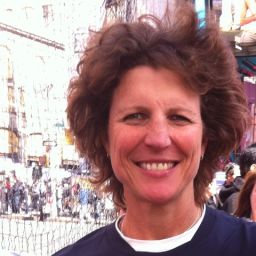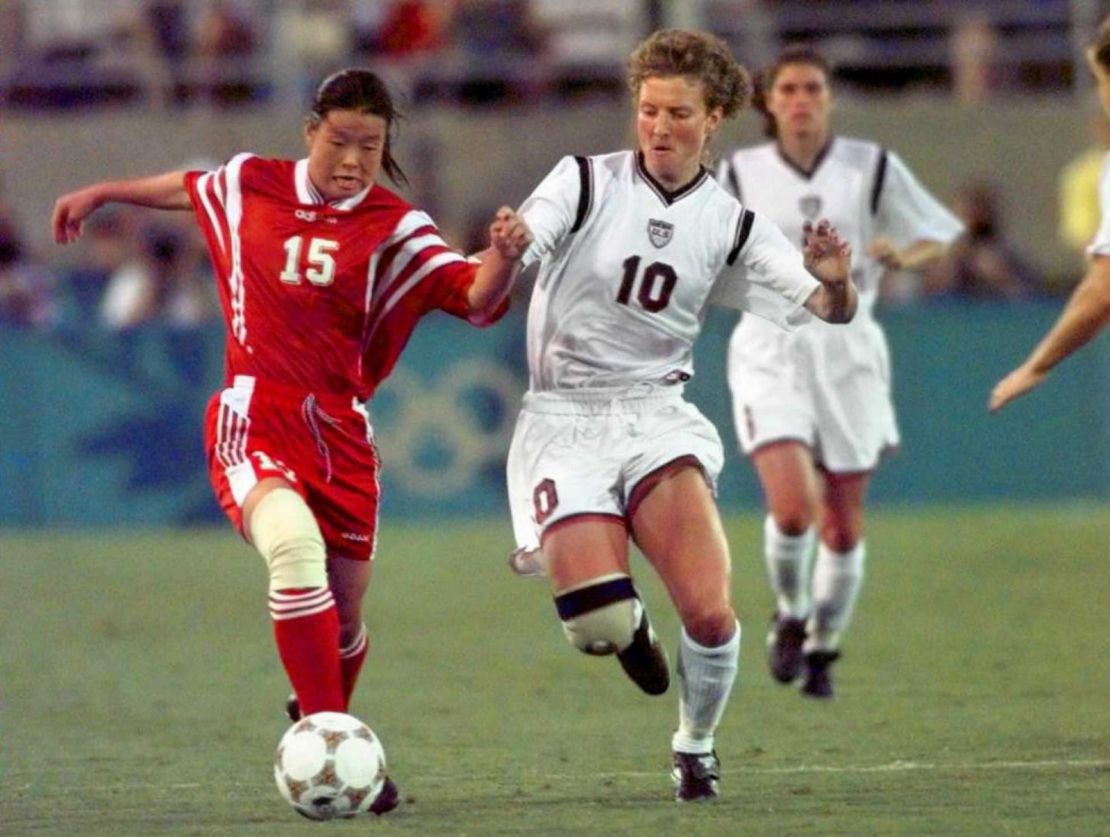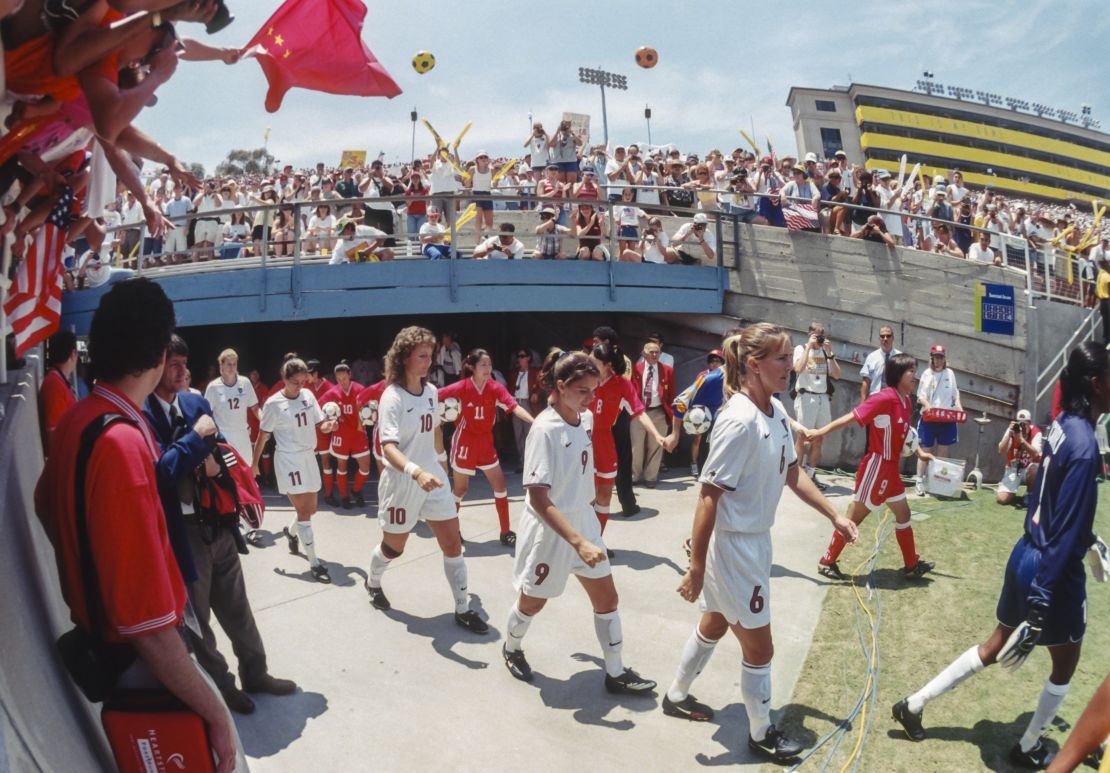Editor’s Note: Michelle Akers was a player on the US Women’s National Teams who won World Cup titles in 1991 (where she won the Golden Boot as top scorer) and 1999. Along with China’s Sun Wen, she was named FIFA’s Female Player of the Century. She is the founder of Michelle Akers Horse Rescue & Outreach, Inc. The views expressed here are hers. Read more opinion on CNN.
As a little girl, I dreamed of being “Mean” Joe Greene and playing for the Pittsburgh Steelers. I wore his No. 75 jersey daily and practiced catching Super Bowl-winning touchdown passes in my front yard for hours.

In third grade, I shared my dream along with my favorite football (and jersey!) with the class, and as I proudly finished my speech, my teacher responded, “Michelle, girls cannot play football” to which I answered, “Yes, I can.” I wouldn’t let it go, landing myself in the principal’s office, trying not to cry. Soon, my mom arrived. “God help me now,” I thought … until I heard her say to both my teacher and the principal, “How dare you tell my daughter what she can or cannot do.”
On Wednesday, all the world (myself included) will watch the 2019 US Women’s National Team – Women’s World Cup champions – as they are honored in New York City. I’m also thinking about how they – like I – got to the place where they lifted that trophy. To me, the 2019 World Cup and above all, this team, has taken the stories and dreams of the USWNT full circle.
It goes like this: First, you dream. Next, you play. Then, you inspire a legacy.

I look back to 1991. After playing soccer for the University of Central Florida and then for the US Women’s National Team, I was on the field in China for the first-ever Women’s World Cup. Our team was an underdog – to everyone but us, because we know we could do it. The USA was not a soccer country back then, like some in Europe or South America, so most of the rest of the world assumed its women’s team would not win. And because globally, women’s soccer was at minimum discouraged and for most considered sacrilege (by the historically male-dominant soccer culture in the countries where the sport was close to a religion), this inaugural Women’s World Cup was the stage for these worlds to collide.
Leading up to and during that tournament, the teams and players endured poor conditions, but performed as people and athletes at the highest level – resulting in two major shocks to soccer and the world: the USA stunned by winning it all and the sport of women’s soccer started to command a new respect. Even so, our reward was a coach-class, 52-hour plane trip home, only to be greeted by minimal media coverage and public awareness of our achievement. We continued to struggle for opportunities to compete and faced skepticism and challenges to our quest to develop as athletes.

Nevertheless, our team pursued its vision and continued to dominate despite the stark support and limited schedule. We focused on what we wanted the sport to become: a place where girls and women could train to become who they wanted to be. We willed it and fought for it, exhaustively. Sometimes at great sacrifice. My teammates and I collectively and individually grew the sport by playing and speaking and representing in whatever venue would welcome us.
Agonizingly and incrementally, things began to change. More firsts occurred. The first ever soccer brand endorsement for a woman, in 1990 when I signed a promotional contract with Umbro. The first time women’s soccer became an Olympic sport, in 1996. We won gold medals in the Atlanta Games and the door inched opened wider. Our legitimacy and value grew in the corporate world. Fathers, daughters, mothers and sons, sisters and brothers began filling stadiums and demanding more opportunity and increased access to this amazing team.
Then came the 1999 World Cup. It was a breakthrough event that reached beyond the game providing a viable portrait of possibility, passion and embodied reality for all who dared to dream of bigger for their lives. Our team consciously connected to our fans. As we played in stadiums previously known only for football - Giants Stadium, the Rose Bowl – our dream became theirs. That World Cup connected people to more than soccer. Our team’s gutsy will to win instilled inspiration and empowered possibilities for everyone who watched us play.
So many years ago, I dreamed of being a Pittsburgh Steeler. But many of the players on this 2019 World Champion USA Team sat in stadiums or watched games on TV in 1999 and dreamed of playing for the USWNT. No one could tell them they couldn’t – they could see for themselves that it was possible. And they took what was so special about those past players and teams and made it their own.
They have now not only won a World Cup, but have turned their dreams into action. Dreams of being the best in the world. Dreams of equality and equal opportunity. And the actions to back them up and make them real for the people who come after them. They are demanding respect and equality from the powers that be because they know what it is to achieve more than just a trophy.
That, for me, is so very powerful. What this 2019 World Champion team demands for themselves – and put first in their lives – will be their biggest message of change: Respect. Equal opportunity. Team and family. Individual choice. Excellence. Into a new era.
And I am grateful to be celebrating them in their much deserved ticker-tape parade in the Canyon of Heroes in NYC.
As always, #GoUSA.


